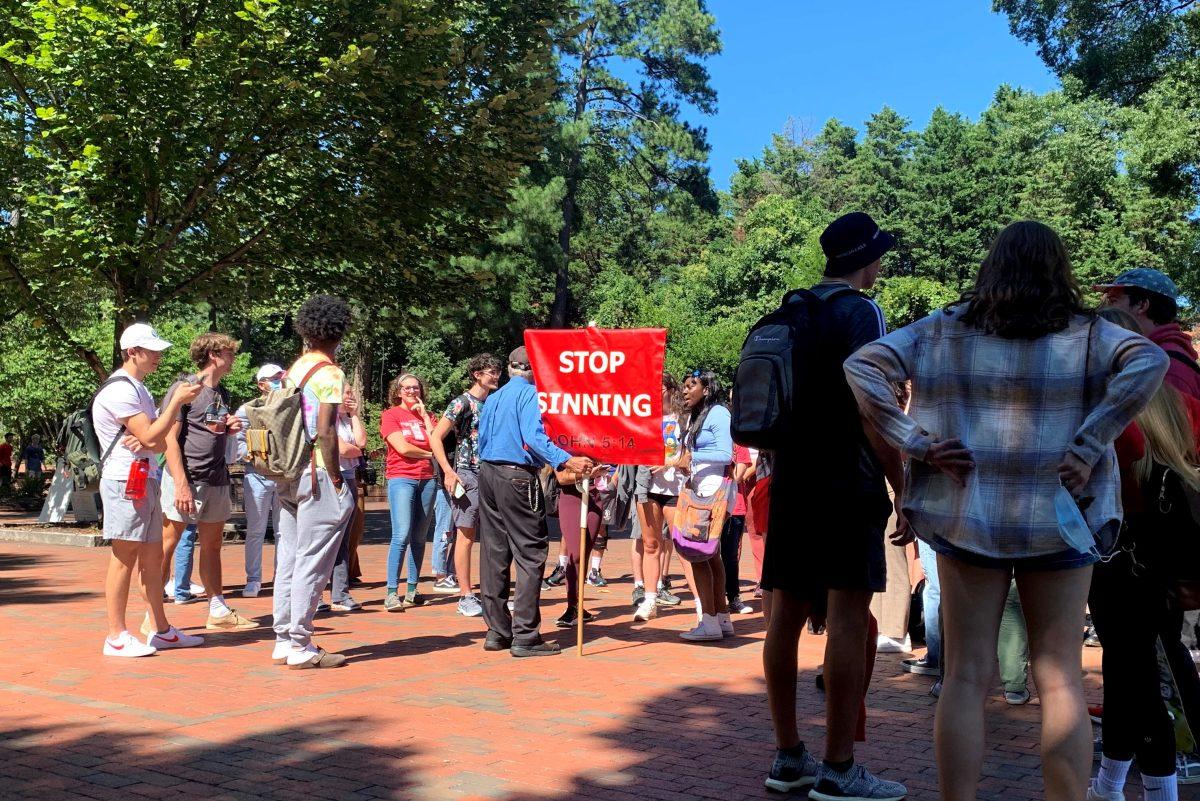As students exited the Free Expression Tunnel on Sept. 23, on their way to Talley Student Union, they heard a loud clamor coming from Wolf Plaza. There stood Gary Birdsong with a sign that reads “Stop Sinning” on one side and “Fear God” on the other. He was surrounded by angry and bemused students.
Preachers have frequented NC State’s campus for decades, and their controversial presence often raises questions. Should they be allowed on campus? What is their real purpose? What are they permitted to do and say?
On that Thursday, Birdsong, a prominent figure on NC State and other North Carolina university campuses, preached and argued with students about various topics like COVID-19, abortion, premarital sex and more. Birdsong also expressed his skepticism of doctors to the crowd.
“Sometimes what the doctors are giving you, you got to watch out for,” Birdsong said. “You got to make sure that’s the right stuff.”
While many preachers frequent campus, Birdsong is one of the most infamous ones. Amelia Van Polanen, a fourth-year studying animal science, said she doesn’t think Birdsong intends to actually make connections with or help students.
“I don’t think he actually is trying to like, preach the word of God,” Van Polanen said. “I don’t think he’s actually trying to reach people’s souls. I think he’s trying to just simply distract and also just feed his own ego almost. I don’t think he’s actually doing it for a truly good purpose, in my opinion, because he is very vulgar with how he does his presentations. I mean, he does a lot of very suggestive movements and motions when he’s referring to certain sexual acts and things like that.”
In 2007, Birdsong was banned for two years from UNC-Chapel Hill’s campus for refusing to leave a space that had been reserved by another organization.
Erica Epps, associate director of Event Services at NC State, said public speakers on campus require a reservation to speak, per university regulation REG 11.55.02.
“Any public speaker would require a reservation for an outdoor space,” Epps said. “And usually they’re reserving Wolf Plaza or the Brickyard [which] are kind of the most popular spots for that. … There are preachers who go through the reservation process and book space like they’re supposed to, per the regulation.”
Even though reservations are technically required, not all speakers go through the process of booking one before they come to campus. According to Epps, they get calls about the preachers frequently, but some preachers get away with speaking without reservations if they don’t cause a disruption.
“In my experience, it hasn’t been people calling just because they’re like, ‘There’s someone public speaking on the Brickyard. I should make sure that they have a reservation, right?’” Epps said. “It’s like, ‘This person is being outlandish. They’re offending people. They’re targeting people. They’re arguing with people.’”
This was the case on Sept. 23, when Birdsong could be heard warning against premarital sex.
“What kind of nation are we living in now?” Birdsong said to the crowd. “Antichrist nation. … You shouldn’t have no condoms [sic]. No sex before marriage. Be in self control.”
Along with preachers like Birdsong, there are also less controversial preachers who enjoy engaging in one-on-one discussions with students.
Another regular campus preacher frequently walks around campus spaces talking with students and handing out free bagels. According to Epps, it is tricky for Event Services to navigate the line between public speaking and walking around a public space speaking with students.
“If your parent came and was walking around Talley, they don’t need a reservation, right?” Epps said. “They’re not technically affiliated with the University. … Talley is a public building, and the campus is a public campus. It is kind of a fine line of what requires permission and what is just you existing in a public space.”
Azariah, another frequent preacher on campus, said he feels inclined to help downtrodden students.
“One day I was coming across campus, and God was speaking to me,” Azariah said. “He said, ‘Look at the faces of the NC State students.’ As I was looking, they were sorrowful, they were down, burdened. You can just see they were just hurting. And God says, ‘Go tell them my word. … Speak to them. Give them hope. Tell them about God’s love.’”
Azariah said he thinks Birdsong’s method of preaching is effective as it allows students to get things off their chest as they argue with him.
“God uses him in a way of bringing things out of people,” Azariah said. “Letting people know what’s inside themselves. So they can look at what’s really real and get an understanding that they need God.”
Some students think the preachers disrupt the peace and should not be allowed on campus. Priscilla Martinez, a second-year studying fashion and textile design, said the preachers can cause stress to students.
“I do not think that they should be allowed on campus because it’s disrupting the peace of the students,” Martinez said. “Sometimes it can be stressful for other people, people who have religious trauma, they might be triggered by that. [The preachers] should just go home.”
If students are concerned about preachers on campus, they can contact Event Services, which will check to make sure preachers are following all university regulations. Students who have been hurt by comments made by preachers or peers on campus are encouraged to contact the BIAS Impact Response Team.













